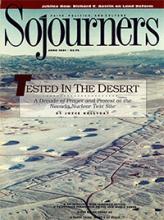When the two Los Angeles police officers returned to their squad car parked in the public housing projects of Pico Gardens, the words "To Protect and To Serve" were faintly visible through the black spray paint that covered them. Some disgruntled and increasingly alienated youths had defaced the LAPD's motto emblazoned on the side of the car. They did this, I imagine, because they knew it did not apply to them nor to their community. "Our motto here is not 'to protect and to serve,' " admitted a local police officer, "but rather, 'get the bad guy.' "
In the March 3 beating of Rodney King by Los Angeles police officers, inner city communities of people of color saw a reflection of their own experience captured for all the world to view. This same scene has been played out in their barrios and ghettos more times than they can remember -- and more often than the police care to acknowledge. In their zeal to "get the bad guy," law enforcement has criminalized the poor and people of color.
In impoverished, urban areas of our country, the "us versus them" mentality of many police departments has translated into a marked disdain and devaluing of the poor. If the operative and controlling principle of law enforcement is "get the bad guy," then the inner city is where the bad guy lives. That single mother walking to the corner store is the bad guy's mother, and the kids playing in the local park are his or her sisters and brothers. Accomplices all; fraternizers with the enemy.
Read the Full Article
